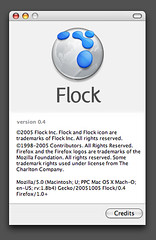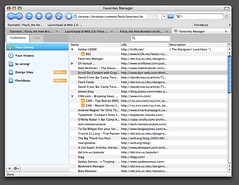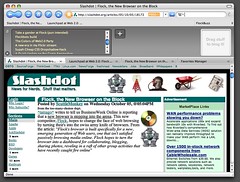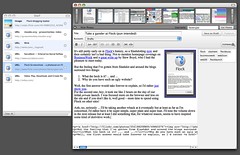One of the questions I am asked most frequently is “what’s the business model for Flock?”
Here’swhy we think Flock is an exciting business opportunity and how weenvision creating a business that is sustainable over the long term.
Firefoxbroke the IE monopoly in the browser space. Users once again havemeaningful choice on the web, and web developers and publishers areresponding to that by making their sites work for Firefox users. Users understand the value of the browser in keeping them safe onlineand providing them with a better user experience. Web developersare able to take advantage of the modern web standards that aresupported in Firefox. Industry leaders are recognizing the powerof the browser platform. In sum: the browser is back!
Inthe ten years since Netscape 1.0 launched, the web has evolvedtremendously, but the user experience of the web browser has remainedlargely unchanged. Firefox supports a host of modern webstandards and eliminates many of the online nuisances that havesprouted up over the last decade. Still, a user migrating fromNetscape 1 to Firefox 1 would feel right at home. We think there’s room for innovating the web browser user experience,and the open soure, cross-platform, and actively developed Mozillacodebase is the perfect technology platform for such innovation.
Thebusiness case? Well, Microsoft set the price of the browser to $0quite a while ago. That proved to be a major hurdle back in theNetscape days, but what’s changed over the past few years is thatonline referral- and search-related business models have matureddramatically and in fact power big chunks of the Internet. Hugebusinesses (like AOL Search) and thousands of niche online venturesalike are built around Google and Yahoo’s adword programs. These same business models are now providing the financial footing forweb browsers. Opera’s CEO recently explained that hiscompany was able to release the browser for free thanks to an expandedsearch sponsorship arrangement with Google. The MozillaFoundation has alluded to search related business arrangements and hascreated a for-profit subsidiary. These success stories show thateven simple search “distribution” integration points in thebrowser can provide a solid financial footing for browser providers,and do so in a way that enhances the user experience (remember, thesearch box was added to Firefox because users needed a faster way tosearch online). In sum, we’re quite comfortable that, ifenough users choose our browser, we can keep the lights on here at Flock without violating user’s privacy or compromising the user experience.
Butof course over time we want to do better then just keeping the lightson. We want to build a successful, sustainable business. While there’s certainly money to be made from stripmining users,as proven by the numerous malware providers and established mainstreamcompanies that routinely abuse their customers’ trust, we believethat, over time, the most successfulcompanies will be those that earn their users’ trust and focuspretty obsessively on solving problems for those users. Best of all, it’s the right thing to do.
Letme give an example: offering users choice at all times is veryimportant to us. Right now, Flock already works with a wide rangeof blogging platforms (Wordpress, Six Apart and Blogger), but, as ofyet, we don’t offer a choice of social bookmarks providers orphoto sharing services. Fixing that is a high priority. Ourgoal is to always offer users a number of choices, and, in addition,allow them to plug in any service that supports a standard, in the sameway that the Firefox and Flock searchboxes and the Flock blog editoralready do.
Firefox is a perfect case in point thatdemonstrates how you can do well by doing what’s right. Theproject started off as a skunkworks project by a couple of guys whowanted to build a better browser. The Firefox crew spent severalyears obsessing about how to build the perfect browser for regularusers. In the process, they were able to create a bond of trustwith their users. When a larger group of users started lookingfor a better alternative, their friends pointed them to Firefox. The organization has done well as a result: a year ago, there were adozen employees at the Mozilla Foundation, now there are several timesthat many working for the Mozilla Corporation.
Sohere’s the plan: we’re going to experiment andinnovate. We plan to make a ton of mistakes, listen to our users,focus on building the best product that meets our users’needs. Where there are obvious, proven, opportunities to generaterevenues in ways that respect our users’ privacy and don’thinder the user experience, we will pursue those. But we firmlybelieve that doing right by our users is the best way to build asustainable, successful company, so expect us to focus pretty much all of our energy on innovating the web browser experience and earning your trust.
Technorati Tags: flock



